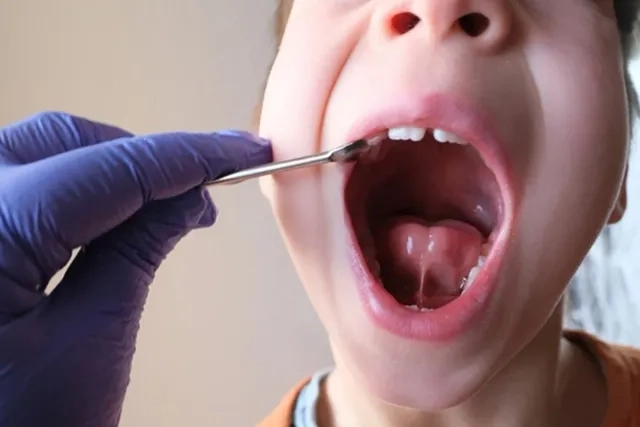Lip Tie Surgery Near Me Bellevue WA
When it comes to our children’s health, we always strive to make the best decisions. We carefully research and consider all options before making any important choices for their well-being. And when it comes to lip tie surgery, the same thought process applies.
Lip tie is a condition that many parents may not be familiar with, but it can have a significant impact on their child’s health and development. In this blog, we will discuss everything you need to know about lip tie surgery near Bellevue WA before making a decision.
From the definition of lip tie to the signs and symptoms, potential risks and benefits of surgery, as well as finding the right specialist for your child, we’ve got you covered. So let’s dive in and learn more about this common but often overlooked condition.
Understanding Lip Ties
Lip ties, also known as lip frenulum, are a common condition that affects many infants. It occurs when the thin tissue connecting the upper lip to the gum line is tight or thick. This can cause difficulties in breastfeeding and even lead to speech problems as children grow older. However, there’s no need to worry as lip ties are easily treatable and understanding this condition can help parents make informed decisions for their child’s well-being.
If left untreated, lip ties can also affect speech development in older children. As they grow and develop their language skills, the tight frenulum can restrict the movement of the upper lip, tongue, and jaw, making it challenging to pronounce certain sounds and words. This, in turn, can lead to speech delays and difficulties in effective communication. By recognizing the signs and symptoms of lip ties, parents can seek early intervention and prevent potential issues with their child’s speech development.
It’s crucial for parents to be proactive in identifying and addressing lip ties to ensure their child’s overall well-being. Early intervention and appropriate treatment can make a significant difference in their ability to breastfeed comfortably and develop speech skills. Remember, lip ties are common, and by understanding and addressing them, parents can help their children thrive.
Signs and Symptoms to Look Out For
Recognizing lip ties in children can be a challenge for parents, especially if they are unfamiliar with the condition. However, being aware of the signs and symptoms can greatly help parents identify and address potential issues promptly. Here are some common indicators of a lip tie:
- Difficulty latching onto the breast or bottle
- Poor weight gain or weight loss in infants
- Inadequate milk transfer during breastfeeding
- Pain or discomfort for the mother while breastfeeding
- Clicking sounds while nursing
- Swallowing excessive air during feeding, leading to gas and fussiness in infants
- Difficulty protruding the upper lip over the lower lip (the “lip flip” motion)
- Speech delays or difficulties in older children
If you notice any of these signs in your child, it’s important to consult a specialist for an evaluation and to explore potential treatment options. By addressing lip ties early on, parents can provide their children with the support and care they need for optimal development.
Understanding the signs and symptoms of lip ties empowers parents to take proactive steps in their child’s healthcare journey. By seeking timely intervention and treatment, parents can ensure their child’s well-being and promote optimal feeding and speech development. Remember, always consult a specialist for a professional evaluation and personalized guidance.
Risks and Benefits of Lip Tie Surgery
Like any medical procedure, lip tie surgery does come with some potential risks. However, the benefits often outweigh these risks for many parents and their children. Some of the potential risks associated with lip tie surgery include:
- Bleeding at the surgical site
- Infection
- Scarring or changes in appearance of the upper lip
- Recurrence of lip tie (in rare cases)
It’s important to discuss these risks with your child’s specialist and follow post-operative care instructions carefully to minimize any potential complications. However, the benefits of lip tie surgery are significant and can greatly improve your child’s quality of life. Some potential benefits include:
- Improved breastfeeding experience for both baby and mother
- Easier latching onto the breast or bottle
- Better milk transfer and adequate nutrition for infants
- Reduced risk of speech delays in older children
- Improved speech development and communication skills
Overall, the potential risks associated with lip tie surgery are minimal compared to the long-term benefits it can provide. As always, it’s important to weigh all options and consult a specialist before making any decisions for your child.

Lip Tie Surgery Near Me Bellevue WA
Importance of Early Detection and Treatment
Early detection and treatment of lip ties are crucial for optimal development and well-being in children. As mentioned earlier, lip ties can cause difficulties in breastfeeding and speech development if left untreated. However, with timely intervention, parents can ensure their child receives the support they need to thrive. Here’s why early detection and treatment are important:
- Easier breastfeeding: Addressing lip ties early on can help infants latch onto the breast comfortably, improving their feeding experience and reducing potential issues like inadequate milk transfer and weight loss.
- Prevents speech delays: By identifying and addressing lip ties in younger children, parents can prevent potential difficulties in speech development as they grow older.
- Minimizes discomfort: Untreated lip ties can cause discomfort and pain for both the baby and mother during breastfeeding. By addressing them early on, parents can ensure their child feeds comfortably.
- Reduces need for more invasive procedures: In some cases, untreated lip ties may require more invasive procedures in older children to address speech difficulties. Early treatment can help prevent this from happening.
- Promotes overall well-being: By addressing lip ties and supporting optimal development, parents can ensure their child thrives physically, emotionally, and mentally.
Recognizing the signs and symptoms of lip ties is crucial for early detection and treatment. With timely intervention, parents can provide their children with the best possible support for optimal feeding and speech development. Remember to consult a specialist for personalized guidance and to weigh all options before making any decisions for your child’s health.
The Procedure: What to Expect
Lip tie surgery, also known as frenectomy or frenuloplasty, is a simple and straightforward procedure that can be performed in a specialist’s office. Here’s what you can expect during the process:
- Examination: The specialist will thoroughly examine the lip tie and assess the appropriate course of action based on the child’s age and condition.
- Numbing: To minimize any potential discomfort, a numbing agent may be applied to the surgical site if necessary.
- Surgical procedure: Using medical tools or a laser, the specialist will delicately release and remove the restrictive tissue of the lip tie.
- Post-operative care: The specialist will provide detailed instructions on how to care for the surgical site and may prescribe pain relievers if needed.
- Follow-up: A follow-up appointment will be scheduled to ensure proper healing and address any concerns or complications that may arise.
The entire procedure is quick and relatively painless, with minimal risks involved. After the surgery, the child can typically resume regular activities shortly, and the lip tie should not recur. It is crucial to follow the post-operative care instructions diligently for the best possible outcome.
Lip tie surgery offers a solution to address the restrictive tissue that can cause difficulties with breastfeeding, speech, and oral hygiene. By having this procedure done, you can help your child improve their overall quality of life and well-being.
If you have any questions or concerns about the procedure, don’t hesitate to consult with a specialist. They will provide you with the necessary guidance and support throughout the entire process.
Lip Tie Surgery: What to Expect After
After undergoing lip tie surgery, your child may experience some minor discomfort and swelling around the surgical site. Don’t worry, this is a normal part of the healing process and should improve within a few days. To help your child recover comfortably, here are some helpful tips to follow:
- Reduce Swelling: Apply ice packs or cold compresses to the area. This will help minimize swelling and provide relief.
- Pain Relief: If your child is experiencing discomfort, consult with the specialist about suitable pain relievers. They can recommend appropriate options to ease any pain.
- Follow Post-Operative Care: It’s crucial to carefully adhere to the post-operative care instructions provided by the specialist. This will ensure the surgical site remains clean and promote optimal healing.
- Soft Foods: Offer soft foods for a few days following the procedure. This will prevent any potential irritation in the mouth and aid in a smoother recovery.
- Monitor for Infection: Keep a close eye on the surgical site for any signs of infection, such as excessive swelling or oozing. If you notice anything concerning, don’t hesitate to reach out to the specialist for guidance.
- Follow-Up Appointments: Attend all follow-up appointments scheduled by the specialist. These appointments are essential to monitor your child’s progress and address any concerns during the recovery period.
Remember, proper care and support are key to ensuring your child can comfortably resume their regular activities. If you have any questions or concerns, don’t hesitate to reach out to the specialist. They are there to help and provide guidance throughout the recovery process.
Cost and Insurance Coverage
Lip tie surgery is a common procedure for infants and children who have a condition called ankyloglossia. This condition occurs when the tongue is tethered to the floor of the mouth by a thick band of tissue, causing difficulties with feeding and speech. While the cost of lip tie surgery may be a concern for many parents, the good news is that most insurance plans cover this procedure because it is considered medically necessary.
When it comes to insurance coverage, it’s important to keep in mind that the specifics may vary depending on your plan and insurance provider. Some plans may require pre-authorization or a referral from your child’s pediatrician before covering the cost of the surgery. To avoid any surprises, it’s always a good idea to check with your insurance company beforehand to have a better understanding of what to expect in terms of coverage.
Apart from insurance coverage, there are other factors that can affect the cost of lip tie surgery. These include the location and expertise of the surgeon, any additional tests or consultations required before the surgery, and post-surgery care. It is crucial to discuss these details with your child’s healthcare provider and insurance company to have a clear understanding of the overall cost.
If you are worried about the financial aspect, there may be options available to you. Some parents may qualify for financial assistance or payment plans, so it’s worth exploring these options as well. However, it’s important to remember that the most important thing is to prioritize your child’s health and well-being above any financial concerns when considering lip tie surgery.
By understanding the insurance coverage, exploring potential financial assistance, and having open discussions with healthcare providers, you can make an informed decision about lip tie surgery for your child. Remember, your child’s health and well-being should always be the primary focus.

Lip Tie Surgery Near Me Bellevue WA
Finding the Right Surgeon for Lip Tie Surgery Near You
When it comes to your child’s health, ensuring they receive the best possible care is of utmost importance. Finding the right surgeon for lip tie surgery is a crucial step towards achieving a successful outcome. To help you in this process, here are some tips that will guide you in finding a qualified and experienced specialist in your area:
- Do thorough research: Begin by researching reputable healthcare providers in your vicinity. Look for specialists who possess ample experience and expertise in performing lip tie surgery. This will ensure that your child receives the highest level of care.
- Seek recommendations: Reach out to trusted friends, family, or your child’s pediatrician for recommendations. Personal experiences or referrals can provide valuable insights into the quality of care provided by a particular surgeon.
- Check qualifications and credentials: Before making a decision, carefully examine the qualifications and credentials of the surgeon. Are they board-certified? Do they possess any specialized training or certifications? These factors can help you gauge their level of expertise.
- Schedule consultations: Narrow down your options and schedule consultations with the surgeons. This will give you an opportunity to discuss your child’s case, ask questions, and evaluate their bedside manner and communication style. It is important to choose a surgeon who not only possesses the necessary skills but also makes you feel comfortable and at ease.
- Trust your intuition: Trust your gut instincts when making the final decision. Choose a surgeon whom you feel confident in and with whom you have a good rapport. Additionally, consider practical factors such as their availability and location.
By following these steps, you can find the right surgeon for your child’s lip tie surgery. Remember to prioritize experience, qualifications, and effective communication when making your decision. With the guidance of a skilled healthcare provider, you can ensure a smooth and successful lip tie surgery for your child.
Take the time to conduct thorough research, seek recommendations, check qualifications, schedule consultations, and trust your intuition. By doing so, you will find a surgeon who will provide the best possible care for your child’s lip tie surgery.
Lip tie surgery is a common procedure for infants and children with ankyloglossia. It is considered medically necessary and most insurance plans cover its cost. However, there are other factors that can affect the overall cost, so it’s important to discuss these details with your child’s healthcare provider and insurance company. When searching for the right surgeon for lip tie surgery, it is important to prioritize experience, qualifications, and effective communication. By conducting thorough research, seeking recommendations, checking credentials, scheduling consultations, and trusting your intuition, you can find a skilled healthcare provider who will ensure a successful outcome for your child’s surgery.
Remember to always prioritize your child’s health and well-being above any financial concerns when considering lip tie surgery. With the support of a qualified and experienced surgeon, you can provide your child with the best possible care and improve their quality of life. So, do not hesitate to reach out for professional help if your child is experiencing any difficulties due to lip tie. Your child deserves the best care, and finding the right healthcare provider is crucial in achieving that. Let’s work together towards ensuring a healthy and happy future for your child.


